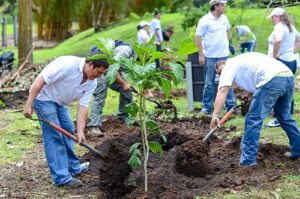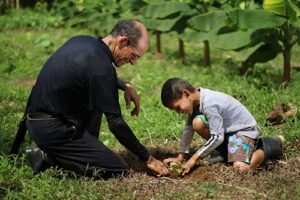One of the fastest ways to offset greenhouse gases is through reforestation. Given how long it takes for trees to grow, it might seem a long haul but that’s really not the case and Costa Rica has proved it. This small Central American country is one of five entities to win the maiden Earthshot prize for Environment 2021. Founded by Prince William and renowned British naturalist Sir David Attenborough, this Nobel-like award “aims to inspire innovative solutions to the most pressing environmental challenges currently facing our planet.”
At the awards ceremony held at London’s Alexandra Palace, Prince William reiterated how “the actions we choose or choose not to take in the next 10 years will determine the fate of the planet for the next thousand.” And David Attenborough said, “the natural world on which we entirely depend is declining at a rate faster than at any time since the end of the dinosaurs. We know where this story is heading and we must now write a different ending.”

Costa Rica is amongst this year’s winners for upholding its end of the story. It has successfully reversed decades of deforestation in a short time. The strategy to pay citizens to restore rainforests and local ecosystems is paying off remarkably.

The ending of our story, however, has to be a joint effort. And the Costa Rica model has valuable lessons that need to be replicated across the world wherever and however possible. It’s quite simple actually, just plain economics: make locals the primary stakeholders in their immediate environment, thereby engaging entire communities in restoring the balance of our planet. Countries suffering from loss of forest cover can use this basic concept to drive individual strategies.

For Pakistan, there are three primary takeaways from Costa Rica’s success. The first is to pay local communities to help restore and protect our natural ecosystems.
In the 1970s and 1980s Costa Rica had one of the highest deforestation rates in Latin America but it managed to reverse the destruction in a matter of decades. In the 1940s, 75 percent of the country was covered in rainforest but by 1987 almost half of it was lost to the timber mafia. So great was the devastation that Costa Rica was on the brink of losing its historic and cultural identity. In 1996, the government banned illegal logging and the following year introduced the Payments for Environmental Services (PES) Programme. It proved to be a cost-effective long-term investment; today around 60 percent of Costa Rica has forest cover that is home to half a million plant and animal species.
The sad truth is that most people in the developing world worry more about their own survival than the state of the Earth, and fail to see the links between the two. The idea of forested refuge for wildlife over that of cattle pastures or farmland seems counter intuitive to most because of financial returns. Livestock and crops are tangible sources of livelihood, whereas most farmers lack the resources to earn from forests. That’s why paying farmers to restore trees and conserve biodiversity has a successful track record. Without economic incentive, locals also lack motivation to stand up to illegal logging.
Most farmers in developing countries are unaware of the significance of biodiversity. They don’t know how to earn from forests. Native communities with spiritual ties to the land and its environment are already a dying breed; their knowledge is dying with them. Very few of their descendants remain interested in preserving the bounties of the Earth. They are being overrun by commercialisation, which is leading to deforestation at an alarming rate. In 2019 — just one year — tropical regions lost close to 12 million hectares of forest cover. That is about the size of the whole of Nicaragua. For that to happen, forests equivalent to 30 football fields were destroyed per minute.
2020 was even worse. Despite what the world believes and despite a global economic slowdown, the COVID-19 pandemic did not slow down deforestation. In fact, 2020 witnessed the burning or hacking down of pristine rainforest the size of the Netherlands, because there was no one to keep a check on illegal loggers. Across the tropics alone, loss of tree cover was 12 percent higher than 2019.
Based on his government’s reforestation success, Costa Rica’s minister for environment and energy, Carlos Manuel Rodriguez, acknowledged that people are more likely to care for the environment if they are provided a steady income. His words: “We have learnt that the pocket is the quickest way to get to the heart.”
The second takeaway for Pakistan is the financing of such a stimulus.
For any government to come up with millions to incentivise local farmers into preserving the environment and replanting forests is no small task. The San Jose government has been successfully financing the Payments for Environmental Services (PES) Programme by taxing fossil fuels. This is a smart dual-pronged strategy that can be tailored to balance out the impact of increased fossil fuel tax. Pakistan is already experimenting with several alternate energy options and by using them in combination with forest agriculture, local communities can be encouraged to understand the benefit of switching to forested landscape.
Countries obviously need to customise the nature and type of reforestation based on local ecology, but certain overarching policies like encouraging tourism are a simple matter of copy and paste. This is where the second takeaway leads into the third. Eco-tourism has been a great stimulus for reforestation efforts in Costa Rica, and what prompted the government to intervene was the country’s integral relationship with nature.
Despite pandemic-linked travel restrictions, Costa Rica earned some $4 billion in 2020 from tourism. That’s 8 percent of the country’s GDP. The majority of tourists to this Central American country choose it for its forest ecology. This level of eco-tourism has a circular impact: tourists bring in revenue which is an incentive to preserve the environment and create more funding for the conservation of nature which in turn brings in more eco-tourists.
Most rural communities in Pakistan have that kind of relationship with the land but not with nature. So for them the incentive has to be more than just monthly payments or subsidies. They need to be equal partners. The government is taking measures to promote tourism but what the country needs is eco-tourism; one that is based on diversity and sustainability.
The PTI government’s ambitious project to plant 10 billion trees by 2023 is facing disconnect problems. Research into the specific types and combination of trees that need to be planted in any given area so that forests can be restored as close to their original state as possible and to avoid a clash with the local ecology is weak, at best. Without proper feasibility studies into land and water, there is the risk of eco-clashing i.e. a mishmash of trees that will damage local ecology.
To be able to use forests as economic resources, management procedures need to be modernised and even digitised to counter corruption, nepotism and misappropriation of funds. Supervision has to shift from bureaucrats to environment experts. Another thing that should work for Pakistan is the proposed debt-for-nature scheme. It is hailed as the “first-of-its-kind nature performance bond linking debt retirement with nature restoration targets.”

Under COP26, rich countries responsible for greenhouse gases are being asked to pledge $100 billion to help poor nations deal with the effects of climate change, switch to clean energy and replant trees. This could partly translate into writing off some debt in exchange for Pakistan meeting its “biodiversity and nature restoration targets.”
At the 26th Conference of the Parties climate summit in Glasgow, world leaders representing over 85 percent of the world’s forests pledged to halt deforestation and reduce methane emissions by 30 percent over the next decade. Pakistan’s forest cover is less than 3 percent, the lowest in the region, whereas it should be over 12 percent. The United Nations repeatedly lists Pakistan in the top 10 countries likely to face the brunt of global warming.
But the government’s ambitious tree plantation plan has a very powerful enemy; the timber mafia and the natives who chop down trees for fuel. That is why we have one of the highest deforestation rates in Asia. Before anything else, illegal logging has to be stopped. There is no point in replanting trees only for them to be mercilessly cut down. Pakistan’s demand for wood is three times more than its sustainable supply. The deployment of paramilitary forces in the northern areas has been significantly effective against illegal logging but is not a long term solution. The demand for wood across industries needs to be tackled on a priority basis for any initiative to be effective in the long term.
There is no time to waste; Pakistan is ranked the 8th most vulnerable country to climate change, and rising temperatures mean 36 percent of glaciers along the Hindu Kush & Himalayan ranges will be gone by 2100. Restoration of forest cover along these mountains can mitigate some of the damage and will go a long way in contributing to global green efforts.

The writer is a senior journalist and an Earth Rights campaigner.



